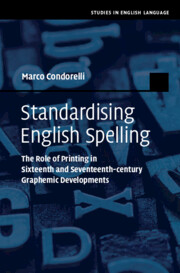 Standardising English Spelling
Standardising English Spelling Book contents
- Standardising English Spelling
- Studies in English Language
- Standardising English Spelling
- Copyright page
- Contents
- Figures
- Tables
- Acknowledgements
- Abbreviations
- Chapter 1 Introduction
- Part I Context
- Part II Empirical Method
- Chapter 4 Corpus Material
- Chapter 5 Rationale
- Chapter 6 Foundational Explorations
- Part III Case Studies
- Bibliography
- Index
Chapter 4 - Corpus Material
from Part II - Empirical Method
Published online by Cambridge University Press: 31 March 2022
- Standardising English Spelling
- Studies in English Language
- Standardising English Spelling
- Copyright page
- Contents
- Figures
- Tables
- Acknowledgements
- Abbreviations
- Chapter 1 Introduction
- Part I Context
- Part II Empirical Method
- Chapter 4 Corpus Material
- Chapter 5 Rationale
- Chapter 6 Foundational Explorations
- Part III Case Studies
- Bibliography
- Index
Summary
Chapter 4 introduces a corpus-based approach to studying spelling variation from a diachronic perspective, as a means for gleaning insights into some of the most frequent large-scale spelling developments in Early Modern English. The chapter acknowledges that the use of data from EEBO TCP is not unproblematic, but makes an empirically based case to argue that any small inconsistencies or transcription errors are unlikely to affect meaningfully a study that focuses on large-scale trends. EEBO TCP represents the best possible compromise existing to date in digital humanities for my specific research scope, and was used as core research material in my work. My study corpus represents a varied, large library of material, reflecting the eclectic collection of texts surviving to date for research in Early Modern English. The chapter also provides an overview of the process of extraction of the corpus material used for my research, which entailed the conversion of the original files from whatever format in which they originally appeared to plain text files.
- Type
- Chapter
- Information
- Standardising English SpellingThe Role of Printing in Sixteenth and Seventeenth-century Graphemic Developments, pp. 61 - 82Publisher: Cambridge University PressPrint publication year: 2022
